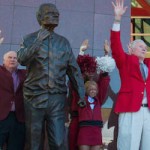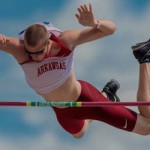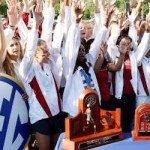 Editor’s note: John McDonnell will be in Little Rock on March 23, 2013, from noon until 4 p.m. signing copies of this book at Go! Running, which is located at 1819 N. Grant in Little Rock. Call our friends at Go! Running 501-663-6800 for more information. Additionally, catch Erin and Gary Taylor from Go! Running on FM 93.3 Weekly Fried with Blake Eddins and Rex Nelson March 18, between 6-8 p.m. as they discuss Coach McDonnell. Gary Taylor was the team captain on McDonnell’s first NCAA Championship track team in 1984.
Editor’s note: John McDonnell will be in Little Rock on March 23, 2013, from noon until 4 p.m. signing copies of this book at Go! Running, which is located at 1819 N. Grant in Little Rock. Call our friends at Go! Running 501-663-6800 for more information. Additionally, catch Erin and Gary Taylor from Go! Running on FM 93.3 Weekly Fried with Blake Eddins and Rex Nelson March 18, between 6-8 p.m. as they discuss Coach McDonnell. Gary Taylor was the team captain on McDonnell’s first NCAA Championship track team in 1984.
John McDonnell spoiled us.
It would be hard for the followers of most college athletic programs to believe that national championships ever become routine, but that was just the case once McDonnell got his track and field program rolling at the University of Arkansas.
Last weekend, Arkansas won its first national title in the post-McDonnell era when Coach Chris Bucknam’s Razorbacks captured the NCAA indoor track and field championship.
“What Coach McDonnell and his previous coaches and athletes have done is unprecedented and will never be matched,” Bucknam said after his team had secured the crown. “But to win another national title for the University of Arkansas, for the community, for the state, it’s something that we’re never going to forget.”
We don’t take those titles for granted anymore.
McDonnell was in attendance last Saturday for the final day of the indoor meet at the Randal Tyson Track Center in Fayetteville. The previous night, he had been in Little Rock to see one of his former athletes, distance runner Frank O’Mara, inducted into the Arkansas Sports Hall of Fame.
As I left the Hall of Fame banquet at Verizon Arena in North Little Rock, there was McDonnell – quiet and unassuming as usual – standing alone. I wondered, “Why isn’t there a line of people waiting for his autograph?”
Such is the life of a track coach. McDonnell, however, finally gets his due this spring in an exhaustively researched book from the University of Arkansas Press titled simply “John McDonnell.”
Author Andrew Maloney helps coach track and cross country at the University of Guelph, a Canadian school in Ontario with more than 21,000 students. He spent six seasons coaching at the University of Tulsa and became familiar with the Arkansas program. Maloney, a lawyer, also writes extensively and is a hockey agent.
The book is a big one. It has more than 400 pages of copy and photos, another 21 pages of records and seven pages of footnotes. In other words, it’s a track junkie’s delight. It should also find its place on the bookshelves of thousands of Razorback fans statewide even if track isn’t their favorite sport.
“My first encounter with John McDonnell occurred in my first few weeks as a collegiate coach at a cross country meet on a hot September day in Joplin, Mo., in 2005,” Maloney writes. “It was still early in the season, but Arkansas had put 10 runners in the top 15 at the first mile of the race at a pace that simply seemed unsustainable. Yet they didn’t seem to be slowing down.
“Over in the shade underneath the trees at the second mile, I observed John calmly but forcefully exhorting his eighth and ninth runners that they do better. It was an interesting juxtaposition to say the least. The man whom I understood to be the most successful coach in American collegiate sports history hustling around the course harder than I was at a third of his age, seemingly dissatisfied with the performance of a team that had just laid waste to the entire field, paying as much and possibly more attention to those at the back of his team than those at the front. This was the quiet dignity and underlying humility and decency that appealed to so many of us who have encountered him over the years.”
Maloney goes on to write that McDonnell is a man “so specially attuned to the human condition that he was able to lead hundreds of student athletes in discovering something about themselves that they didn’t know was within them.”
In his foreward to the book, Alan Sugg, the former University of Arkansas System president, writes: “I have personally known many great leaders in education, business, politics, athletics, the military and other fields. I can honestly say that John McDonnell is one of the most, if not the most, productive and successful leaders that I have ever known. He has a special God-given talent to encourage and inspire young men to achieve goals that they never dreamed were attainable. And those young men love and respect their coach like a father.
“John’s human qualities are very much a part of his tremendous leadership ability. He knows what it takes to be a great track athlete. He works extremely hard, is completely honest and always treats others with dignity and respect. John created a winning environment by first believing that the Razorback men’s track and field program could be the very best in the nation. But his confidence in himself and his team was coupled with a profound humility that led him to win the right way – with class and grace.”
McDonnell came to this country as an Irish immigrant at age 26 and found a job as a cameraman for WOR-TV in New York.
His pay?
About $220 a week.
He loved to run and had experienced success as a runner back home in Ireland. Though he was older than the average college student, he was offered a scholarship to what’s now the University of Louisiana-Lafayette to run track. McDonnell had been born July 2, 1938, in County Mayo in Ireland. He grew up on a dairy farm, milking cows by hand before and after school.
“Knowing what hard work was didn’t do me any harm,” he once said.
When Irishman Ronnie Delaney won the 1,500-meter run at the Melbourne Olympics in 1956, thousands of Irish boys decided they wanted to be just like Delaney. McDonnell was among them. He figured that he had found his calling when he beat a university 800-meter champion even though McDonnell was wearing soccer shorts and running in his bare feet.
McDonnell moved to Dublin, where he found much stiffer competition than had been the case in County Mayo. McDonnell, who was no longer dominating the races he entered, became discouraged. At a national cross country race, though, a former national champion told him he had talent and encouraged him to keep working. McDonnell easily won the race the following year.
“Having somebody believe in you and you believe in them was the key,” he said.
McDonnell eventually won six Irish national championships. He qualified for the Rome Olympics in 1960, but Ireland was a poor country and could only afford to send one runner to Italy. Someone else was picked.
“I thought, ‘There will be another Olympics,’ but there wasn’t,” McDonnell said. “Tomorrow may never come.”
McDonnell went to New York to spend the summer with an aunt and compete in track for the New York Athletic Club. After being hired at WOR-TV, he decided to stay in the United States. McDonnell worked in the cameraman’s job for 18 months before moving south to Lafayette, getting a bachelor’s degree in education, earning All-American honors in track and even coaching a bit.
McDonnell graduated from college in 1969, the same year he became a U.S. citizen. He coached at New Providence High School in New Jersey in 1969-70 and at Lafayette High School in Louisiana in 1971 before being hired at Arkansas. McDonnell, whose 42 national titles at Arkansas are more than any coach in any sport in the history of collegiate athletics, was inducted into the Arkansas Sports Hall of Fame in 1987.
McDonnell initially had been hired at Arkansas in 1972 as the cross country and assistant track coach. He took over as the head track coach in 1978 when Ed Renfrow left the profession. The early foundation of his team was built with Irish distance runners such as Niall O’Shaughnessy, Tom Aspel and O’Mara.
“His affection for and commitment to the University of Arkansas and the state of Arkansas are undeniable,” O’Mara said. “How rare is it to find a highly successful coach with tenure of more than 35 years at the same school?”
McDonnell retired in June 2008, only weeks short of his 70th birthday.
At the time of his retirement, McDonnell told Frank Litsky of The New York Times: “My intensity is fine, and my health is good. But you don’t know what’s in store for you, so you want to spend time with your wife. Ellen has been a track widow for 36 years. She raised the kids, and every time something happened, I was out of town.
“I wish I could have spent more time with the kids when they were growing up. There was always a meet. Heather, my daughter, played tennis and won two state championships, and I never saw her do it. Sean, my son, was racing motorcycles and doing well, and I didn’t see him doing it enough. I haven’t lost that fire to coach, but it’s time for me to get away from the pressure. It’s the pressure I put on myself. It has been a terrific ride.”
The next step was to head to his 2,500-acre ranch in Pryor, Okla., and raise cattle.
With Arkansas finally back on top of the college track world (at least indoors), the time seems right for a major book to come out about the man who built the program.
“I feel like when I retired, I gave Chris the baton, and he has done a great job of carrying it,” McDonnell said last weekend. “Now he has taken it all the way to the finish line.”
After 400 pages, the reader will be able to say that Andrew Maloney has done the same: He has taken the story of how the dynasty was built to the finish line.












